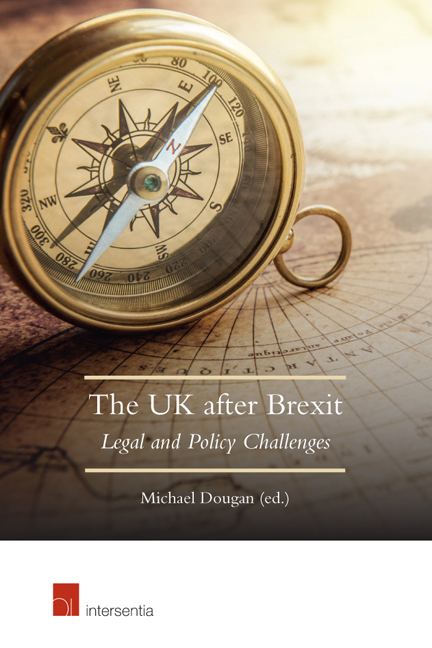Book contents
- Frontmatter
- Contents
- List of Authors
- Editor's Introduction
- Part I Constitutional Issues
- Part II Substantive Policies
- Part III External Relations
- Chapter 11 Membership of the World Trade Organization
- Chapter 12 UK Trade Policy
- Chapter 13 UK Foreign Investment Protection Policy Post-Brexit
- Chapter 14 Brexit and International Peace and Security: A Crisis for Crisis Management?
- Chapter 15 Brexit and Relations between the EU and the UK
- About the Editor
Chapter 14 - Brexit and International Peace and Security: A Crisis for Crisis Management?
from Part III - External Relations
Published online by Cambridge University Press: 13 October 2018
- Frontmatter
- Contents
- List of Authors
- Editor's Introduction
- Part I Constitutional Issues
- Part II Substantive Policies
- Part III External Relations
- Chapter 11 Membership of the World Trade Organization
- Chapter 12 UK Trade Policy
- Chapter 13 UK Foreign Investment Protection Policy Post-Brexit
- Chapter 14 Brexit and International Peace and Security: A Crisis for Crisis Management?
- Chapter 15 Brexit and Relations between the EU and the UK
- About the Editor
Summary
INTRODUCTION
Both before and following the referendum of 23 June 2016, news coverage and discussion predominantly focused upon the economic and immigration consequences of the United Kingdom's exit from the European Union. In the lead-up to the referendum, and since, there has been a more limited focus upon the impact of Brexit upon issues affecting international peace and security. However, discussions that focus purely on issues of the economy and immigration tend to forget both the fact that the initial overriding purpose of economic integration between European states was to preserve peace and security amongst them and that that ability to manage refugee flows is inextricably linked to the ability to deal with international conflict and crises. While issues of peace and security will undoubtedly play a role in the forthcoming negotiations, the full implications of the UK's divorce from the EU on these issues may not be known for some time. Nonetheless, the potential implications deserve reflecting upon.
The purpose of this chapter is to thus offer some reflections upon how the UK's withdrawal from the EU might affect the system of international peace and security and, in particular, the three key organisations – the United Nations (‘UN’), the North Atlantic Treaty Organisation (‘NATO’) and the European Union (‘EU’) itself, in particular its Common Security and Defence Policy (‘CSDP’) – that exist with a crisis management function. The term ‘crisis management’ is employed here as it provides a useful ‘catch-all phrase’ to describe the various civilian and military operations that these three organisations engage in ‘to prevent conflict from bursting into crisis, assist in enforcing the peace, keep the peace or build the peace’. The UK has been a prominent member of these three organisations, whether due to its permanent membership of the UN Security Council, a founding member and keen champion of NATO, or through its vital contribution in the development of the EU's CSDP.
- Type
- Chapter
- Information
- The UK after BrexitLegal and Policy Challenges, pp. 287 - 304Publisher: IntersentiaPrint publication year: 2017
- 1
- Cited by



